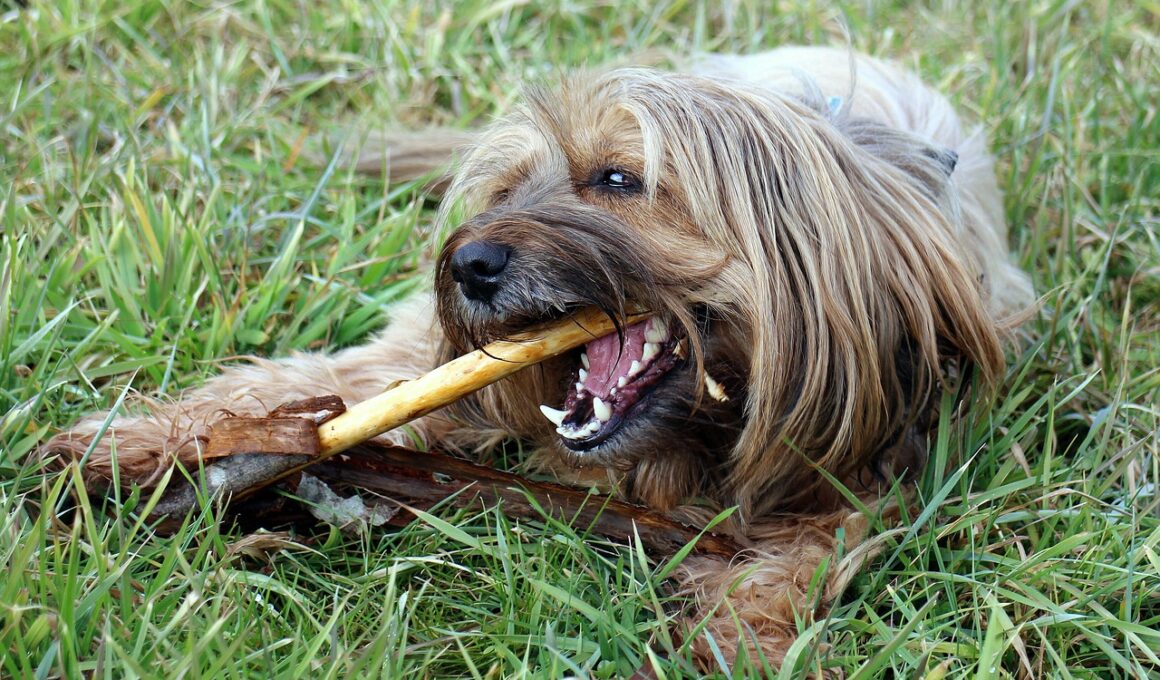Impact of Aging on Gingivitis Development in Dogs
Gingivitis is a common dental issue found in dogs and can be significantly influenced by aging. As dogs age, their dental health tends to deteriorate due to a variety of factors. This deterioration can exacerbate gingivitis, leading to inflammation and discomfort. Older dogs are often more prone to accumulation of plaque and tartar, which can irritate the gums. Additionally, the immune response in aging dogs is not as robust, making it harder for their bodies to fight off infections. Without proper dental care, gingivitis can advance to more severe conditions, such as periodontal disease. Regular dental check-ups and maintaining proper oral hygiene are essential for older dogs. Owners should focus on a balanced diet that assists dental health. Furthermore, certain chew toys can help reduce plaque accumulation. It’s critical for dog owners to recognize the symptoms of gingivitis, including halitosis and swollen gums. Early intervention can prevent further complications and improve the quality of life for aging pets. Consulting with veterinarians about aging-related dental care can lead to tailored strategies for managing gingivitis effectively in senior dogs.
One of the prevalent issues affecting older dogs is difficulty in maintaining good dental hygiene. Aging dogs often experience changes in their behavior that may include reluctance to chew or play. This can lead to a reduced ability to keep their teeth clean naturally, increasing the risk of gingivitis. As dogs age, they may also face other health problems that can complicate their dental care. For instance, conditions like arthritis can affect their mobility, making it challenging for them to groom themselves or visit the vet for dental cleanings. Additionally, older dogs might require medications that cause dry mouth, further exacerbating dental issues. Regular teeth brushing can be beneficial but might be difficult for some owners to manage consistently. Instead, seeking professional dental cleanings can help remove plaque and tartar buildup effectively. Incorporating dental treats designed for older dogs can also aid in maintaining oral hygiene while accommodating their health conditions. As a responsible pet owner, it’s crucial to monitor your dog’s dental health regularly and consult with your veterinarian about the most effective strategies for managing gingivitis as your dog ages.
To understand the impact of aging on gingivitis, it’s vital to recognize the structural changes occurring in a dog’s mouth over time. As dogs age, their teeth and gums can experience wear and tear. This structural change can create spaces where bacteria thrive, leading to plaque buildup and, subsequently, gingivitis. Furthermore, gum recession in older dogs can expose tooth roots, making them more susceptible to dental disease. The importance of preventive dental care cannot be overstated. Dogs of all ages can benefit from regular dental testing to ensure their oral health is optimal. Owners should remain vigilant regarding any changes in their dog’s mouth, monitoring for visible signs of inflammation, bleeding, or discomfort when eating. Providing soft food or altering the texture of their diet can be necessary for older dogs with gingivitis. As dogs mature, health screenings that include dental assessments may become essential to manage ongoing dental care effectively. Implementing a multi-faceted approach to oral care, including the use of vet-recommended dental products, can significantly reduce the severity of gingivitis in aging dogs and promote healthier teeth and gums.
Setting a Dental Care Routine
Establishing a robust dental care routine early in your dog’s life can prevent issues like gingivitis as they age. Daily dental hygiene should involve brushing your dog’s teeth with dog-friendly toothpaste. This practice prevents plaque buildup and promotes healthy gums. Dog owners are advised to start dental care at a young age, allowing their pets to become accustomed to the process. Additionally, using dental chews can supplement brushing by helping remove plaque and freshening breath. Regular veterinary visits for dental cleanings and assessments are equally important. The vet can provide tailored recommendations for age-appropriate dental care products. Owners should also consider incorporating natural dental care alternatives like carrots or apples into their dog’s diet, which can help maintain tooth cleanliness. Moreover, observing your dog’s behavior can provide insight into their oral comfort. Symptoms such as reluctance to eat or play can indicate existing dental issues. Establishing open lines of communication with your veterinarian about any changes or concerns ensures proactive management of dental health and mitigates the risks associated with gingivitis.
As we delve deeper into the connection between aging and gingivitis, it’s essential to highlight that lifestyle factors can also play a significant role. The diet a dog consumes, regular exercise, and preventive healthcare all contribute to oral health. Senior dogs may experience weight gain, which can complicate their ability to maintain an active lifestyle. Reduced activity levels can impact their overall health, including their dental health. Ensuring an appropriate diet rich in essential nutrients while being mindful of their weight can be beneficial. Hydration plays a crucial role too; dogs must have access to fresh water at all times to help wash away food particles and bacteria that accumulate in the mouth. Additionally, engaging older dogs in gently stimulating activities can enhance their physical and emotional well-being. Regular play not only strengthens your bond but can also promote better dental health indirectly. This holistic approach significantly influences how effectively you manage gingivitis and maintain overall oral health. In summary, combining consistent dental care routines with healthy lifestyle choices lays a foundation for aging dogs to enjoy optimal dental health.
Additionally, professional dental cleanings should not be overlooked, especially for dogs aged seven years and older. The vet can thoroughly assess the dental state of your dog and perform cleanings that are often missed at home. Veterinary dental care can also incorporate preventive treatments like fluoride applications and sealants. These treatments help protect teeth from decay while reducing the risk of gingivitis. Understanding the importance of oral health can drive dog owners to schedule annual dental check-ups as part of their pet’s general healthcare routine. Not only do regular cleanings help prevent gingivitis, but they can also identify other dental issues early. Common conditions such as tooth fractures or abscesses may not present symptoms until they become severe. Therefore, being proactive about dental visits holds significant importance for older dogs. Ultimately, fostering a routine that includes both home and professional care can significantly reduce the risk of developing gingivitis in aging pets. As a dog owner, remaining committed to your dog’s dental health will ensure a happier and healthier life for your furry companion.
Conclusion: Healthy Teeth, Happy Pets
In conclusion, understanding the impact of aging on gingivitis development in dogs is crucial for their welfare. Aging influences a dog’s dental health significantly, primarily due to changes in immune function, behavior, and structural integrity of teeth and gums. By prioritizing dental care and maintaining a consistent routine, pet owners can mitigate the effects of gingivitis. Implementing strategies like regular dental checks, proper nutrition, and home care can maintain optimal oral health and prevent complications. Remember, keeping your dog’s mouth healthy contributes to their overall wellness. Early intervention in dental care can enhance their quality of life significantly. As dogs age, maintaining open communication with veterinarians to discuss any concerns can help tailor their dental care needs. It’s not just about preventing gingivitis, but promoting a holistic approach to their health. Dental care should be an integral part of your pet care strategy, ensuring they enjoy their golden years comfortably. Achieving healthy teeth leads to happier pets, ensuring a rewarding companionship filled with joy, love, and longevity.
Ultimately, loving and caring for an aging dog encompasses understanding their unique dental needs. Through diligence and proactive care, we can honor their years of loyalty and companionship. As responsible dog owners, it’s our duty to ensure they not only enjoy their food but also maintain a vibrant and pain-free life. Patience and understanding play a large role in this, especially with senior pets experiencing various age-related changes. By fostering a nurturing approach to their dental health, we create a positive impact in their overall welfare. Frequent dental check-ups and nutritional adjustments may seem cumbersome, but they are crucial. Maintaining our furry friends’ well-being can lead to treasured memories and joyful moments throughout their lives. Emphasizing preventive care as our dogs age will spare them from unnecessary suffering and discomfort. Ensure you celebrate every stage of their journey, and remain observant, as small changes can indicate larger issues. Commitment to dental care is a pathway to achieving a fulfilling life for our furry companions.


